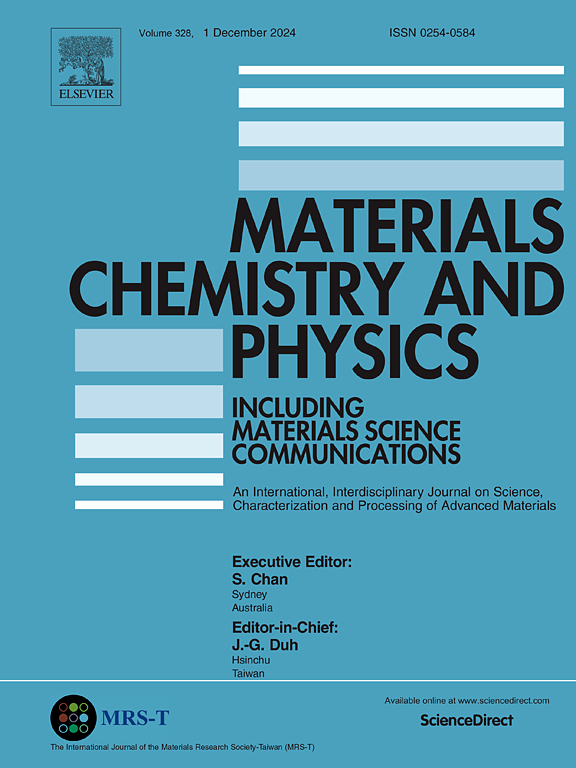Synergistic effects of FeOOH–Mn@HC catalyst in peroxymonosulfate activation for antibiotic degradation
IF 4.3
3区 材料科学
Q2 MATERIALS SCIENCE, MULTIDISCIPLINARY
引用次数: 0
Abstract
This study investigates the degradation of oxytetracycline using a novel FeOOH–Mn@HC catalyst system, designed to enhance peroxymonosulfate activation for effective antibiotic removal from water sources. The catalyst was synthesized and structurally characterized using FT-IR, XRD, FE-SEM, BET, and EDX analyses, ensuring a comprehensive understanding of its physicochemical properties. Batch experiments were conducted to assess the catalytic performance under varying operational parameters, including initial OXY concentration, catalyst dosage, PMS concentration, pH, reaction temperature, and contact time. The optimal conditions were determined as an initial OXY concentration of 5 ppm, catalyst dosage of 100 mg/L, PMS concentration of 1 mM, pH 11, reaction temperature of 30 °C, and a contact time of 80 min, achieving a remarkable 99.9 % degradation efficiency within the first 80 min of reaction. Kinetic modeling confirmed the efficiency of FeOOH–Mn@HC in activating PMS to generate sulfate radicals, leading to the rapid breakdown of OXY. Toxicity analysis using ECOSAR indicated that the transformation products formed during degradation exhibited reduced toxicity compared to the parent compound. These findings highlight the catalyst's potential for sustainable water treatment applications, offering an effective strategy to mitigate antibiotic pollution. The study contributes to the advancement of environmentally friendly remediation approaches, ensuring the safety of water resources and addressing global concerns regarding pharmaceutical contaminants in aquatic environments.

FeOOH - Mn@HC催化剂在过氧单硫酸盐活化降解抗生素中的协同作用
本研究使用一种新的FeOOH - Mn@HC催化剂体系研究土霉素的降解,该催化剂体系旨在增强过氧单硫酸盐的活化,从而有效地从水源中去除抗生素。通过FT-IR, XRD, FE-SEM, BET和EDX分析对催化剂进行了合成和结构表征,确保了对其物理化学性质的全面了解。在初始氧浓度、催化剂投加量、PMS浓度、pH、反应温度和接触时间等不同操作参数下,进行了批量实验,考察了催化性能。最佳条件为初始氧浓度为5 ppm,催化剂用量为100 mg/L, PMS浓度为1 mM, pH为11,反应温度为30℃,接触时间为80 min,反应前80 min降解效率达到99.9%。动力学建模证实了FeOOH - Mn@HC在激活PMS产生硫酸盐自由基,导致氧快速分解的效率。ECOSAR毒性分析表明,与母体化合物相比,降解过程中形成的转化产物毒性降低。这些发现突出了催化剂在可持续水处理应用中的潜力,为减轻抗生素污染提供了有效的策略。该研究有助于促进环境友好型修复方法的发展,确保水资源的安全,解决全球对水生环境中药物污染物的关注。
本文章由计算机程序翻译,如有差异,请以英文原文为准。
求助全文
约1分钟内获得全文
求助全文
来源期刊

Materials Chemistry and Physics
工程技术-材料科学:综合
CiteScore
8.70
自引率
4.30%
发文量
1515
审稿时长
69 days
期刊介绍:
Materials Chemistry and Physics is devoted to short communications, full-length research papers and feature articles on interrelationships among structure, properties, processing and performance of materials. The Editors welcome manuscripts on thin films, surface and interface science, materials degradation and reliability, metallurgy, semiconductors and optoelectronic materials, fine ceramics, magnetics, superconductors, specialty polymers, nano-materials and composite materials.
 求助内容:
求助内容: 应助结果提醒方式:
应助结果提醒方式:


